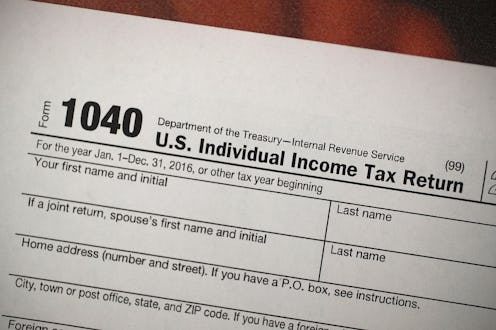News
Average Tax Refunds Are Lower This Year, According To Early IRS Stats

Early data from the Internal Revenue Service appears to indicate that tax refunds are lower this year than in the past, with people receiving smaller refunds than they did last year. The IRS data, which includes filing season statistics through Feb. 1, states that the average refund thus far in 2019 is $1,865, compared to $2,035 at the same time in 2018.
This marks a nearly 8.4 percent decrease in average tax refunds since last year — a phenomenon that some people have attributed to President Trump's newly enacted tax bill. According to Vox, the GOP-backed 2017 Tax Cuts and Jobs Act primarily lowered taxes for wealthy business owners. However, this legislation also curbed or eliminated popular deductions — such as the home mortgage interest deduction and the state and local tax deduction — which meant that taxpayers had to recalculate precisely how much of their income they needed to withhold for tax purposes.
Typically, Forbes reported, the majority of taxpayers overwithhold income, because it's easier for the IRS to issue refunds than it is to collect additional money. But due to all the changes implemented by Trump's tax bill, the General Accounting Office projected last year that more people would under-withhold income than in the past — and that seems to be what is happening now.
It is true that employers are generally tasked with withholding income tax from their employees' paychecks, but employees can also use W-4 forms to claim allowances or exemptions that would change how much money that their employers withhold. When the new tax bill went into effect, the IRS provided employers with resources that outline how much money to withhold, as well as updated W-4 forms. However, the amount of money being withheld from employees' paychecks nonetheless decreased too much, Vox reported, resulting in more taxpayers who ended up owing money rather than receiving refunds at filing time.
As HuffPost pointed out, this reduction in tax refunds could most dramatically affect low-income taxpayers, who often file early to receive their refunds as soon as possible. Many taxpayers use tax refunds to make important payments, HuffPost explained, or to make larger purchases.
But tax refunds are not the only thing that have decreased since last year. According to early IRS data, fewer taxpayers have filed their taxes in the early days of this year's filing season than they did last year. The IRS reported that it had received just over 16 million tax returns by Feb. 1 this year, down from approximately 18.3 million by the same time in 2018.
According to The Hill, this year's tax filing season started just after the longest government shutdown in American history, which lasted for 35 days. During the shutdown, numerous IRS employees skipped work due to financial difficulties, The Washington Post reported, as many of them were expected to process tax returns without being paid themselves. Despite concerns that the shutdown would significantly delay tax return processing, however, Treasury Secretary Steven Mnuchin applauded the IRS on Friday for "successfully" launching the filing season.